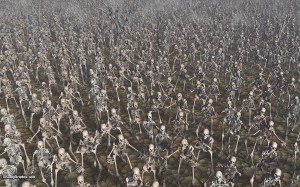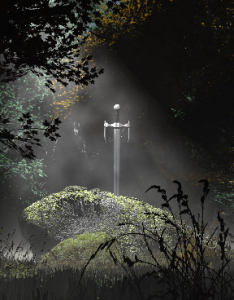On Friday we comb through our extensive archives to find an older article that we feel deserves another look. From October 23, 2012, Dungeon’s Master once again presents: 5 Ways to Make Mindless Undead More Interesting.
 A lot of DMs have a love/hate relationship with undead; I know I do. Whenever I need a monster to round out an encounter I know that some kind of undead will always fill the gap. With so many different kinds of undead to choose from they can easily become the go-to monsters. However, as the party gets tougher I find that I’m less likely to use undead staples like skeletons and zombies. Sure I can adjust their scores to make them level-appropriate for tougher parties but these undead are really one-trick ponies. By the time the party reaches upper heroic tier they know the trick and they’re no longer impressed.
A lot of DMs have a love/hate relationship with undead; I know I do. Whenever I need a monster to round out an encounter I know that some kind of undead will always fill the gap. With so many different kinds of undead to choose from they can easily become the go-to monsters. However, as the party gets tougher I find that I’m less likely to use undead staples like skeletons and zombies. Sure I can adjust their scores to make them level-appropriate for tougher parties but these undead are really one-trick ponies. By the time the party reaches upper heroic tier they know the trick and they’re no longer impressed.
This is why I try to limit how often I use undead creatures in my campaign. Some of the most common undead, at least the ones you’re most likely to encounter in great numbers (skeletons and zombies) tend to be mindless. They rely on their overwhelming numbers rather than any advanced tactics. After all, how can a creature with no brain, or a rotten decaying brain, think at all? This lack of reason makes them boring and predictable.
But undead have their place in D&D and we shouldn’t just cast any of them aside, regardless of the PCs’ level. So in order to make mindless undead more interesting I’ve come up with 5 tips that the players won’t see coming and the PCs will never forget.
